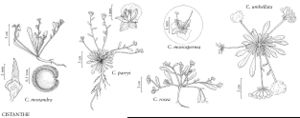Cistanthe tweedyi
Phytologia 68: 268. 1990.
Plants perennial, taprooted; caudex short-branching. Stems 1 or more from each rosette, 10–20 cm, bracts scattered proximally, ovate-lanceolate, scarious. Leaves basal, in loose rosettes; blade elliptic-lanceolate to ovate or oblanceolate, narrowing to broad petiole, 6–15 cm. Inflorescences racemose, 1–5(–8)-flowered. Flowers pedicellate; sepals broadly ovate, 9–10 mm, scarious; petals 7–9(–12), salmon-pink to yellowish, rarely white, 25–40 mm; stamens 10–23, anther yellow; style present; stigmas 3; pedicel 20–60 mm. Capsules ovoid, 7–10 mm, dehiscence circumscissile near base; valves 3–4, splitting from base toward apex. Seeds 12–35, dark brownish red, suborbicular to reniform, 2 mm, not shiny, warty, strophiolate. 2n = 46, 92.
Phenology: Flowering May–Jul.
Habitat: Well-drained granitic talus slopes and ledges, often in ponderosa pine duff
Elevation: 600-2200 m
Discussion
Of conservation concern.

